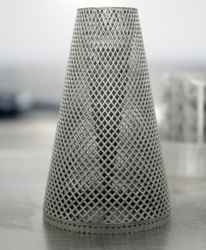
Posted to News on 19th Jul 2016, 15:59
How additive manufacturing can boost machine reliability
Companies that rely on machines are continually seeking new ways to improve reliability and reduce operational costs. Neil Burns, director of Croft Additive Manufacturing, looks at how the manufacture of small components, such as filters, can play a significant role in improving operational efficiency and why machine builders should be taking advantage.

As the world becomes ever more reliant on automated technology, many businesses depend on a continual stream of productivity and look to purchase more robust machinery to support their operations. For machine builders seeking to meet this demand, it means producing more cost-effective and dependable equipment. These are machines that not only perform as required but can also be relied upon to deliver consistent results at all times.
As filtration plays a pivotal role in many machines across a wide range of industries, making sure the filtration components within them are as reliable as possible is vital, as reliable filters help to prevent costly breakdowns and operational delays for end-users.
Over the last few years, the technology used in machinery has advanced considerably, and there has been a greater level of demand for customised filtration components that meet very specific needs of particular applications. Using traditional means of manufacture, more complex filters can be difficult and costly to produce, especially when it comes to larger volumes.
With this in mind, making use of filters that have been produced through additive manufacturing (AM) processes is a growing trend for machine builders due, in part, to a number of practical benefits.
Additive manufacturing of filters

This innovative process means that only one production cycle is needed to graduate metal thicknesses, produce internal features or, ultimately, produce bespoke, finished products. When it comes to the creation of filters, this can result in significantly improved performance characteristics.
There is a lot to be gained by using AM as a manufacturing method, especially in terms of filter efficiency, due to the highly accurate design and manufacturing process. Compared with woven wire mesh filters, for example, AM filters offers a more uniform aperture size, greater strength and a longer life span overall. The simplified production process and enhanced durability can lead to significant savings for end-users in replacement costs and, in turn, a more attractive offering for machine builders.
Bespoke products

Current trends suggest that, over the next few years, we will continue to see improvements in AM that will result in greater levels of accuracy, print sizes and the strength of filters. In turn, this will mean that costs will decrease for machine builders, while turnaround times will reduce further.
Although a revolutionary method for producing filters, AM will not replace traditional manufacturing completely. Rather, AM provides an additional tool for manufacturers, helping to create products that are otherwise unattainable.
Croft Filters, a sister company of Croft Additive Manufacturing, manufactures and fabricates its products in-house using AM as well as other innovative methods to provide high-quality, reliable filters for a wide range of sectors in the UK and overseas.
The company can create filters for machine builders quickly and to specific requirements. Its team of specialist engineers, working with a wide range of materials, is happy to meet any filtration requirements. All employees at the business undergo ongoing training and are experts in their own areas of responsibility, ensuring continual improvement and the best possible service.
Croft Filters operates ISO 9001 quality assurance procedures and is a member of the Engineering Industries Association. For more information about Croft Additive Manufacturing, visit www.croftam.co.uk or for further information about Croft's filter offering, go to www.filters.co.uk.
Want the latest machine building news straight to your inbox? Become a MachineBuilding member for free today >>
T1, Taylor Business Park
Risley
WA3 6BL
UNITED KINGDOM
+44 (0)1925 757 070

















